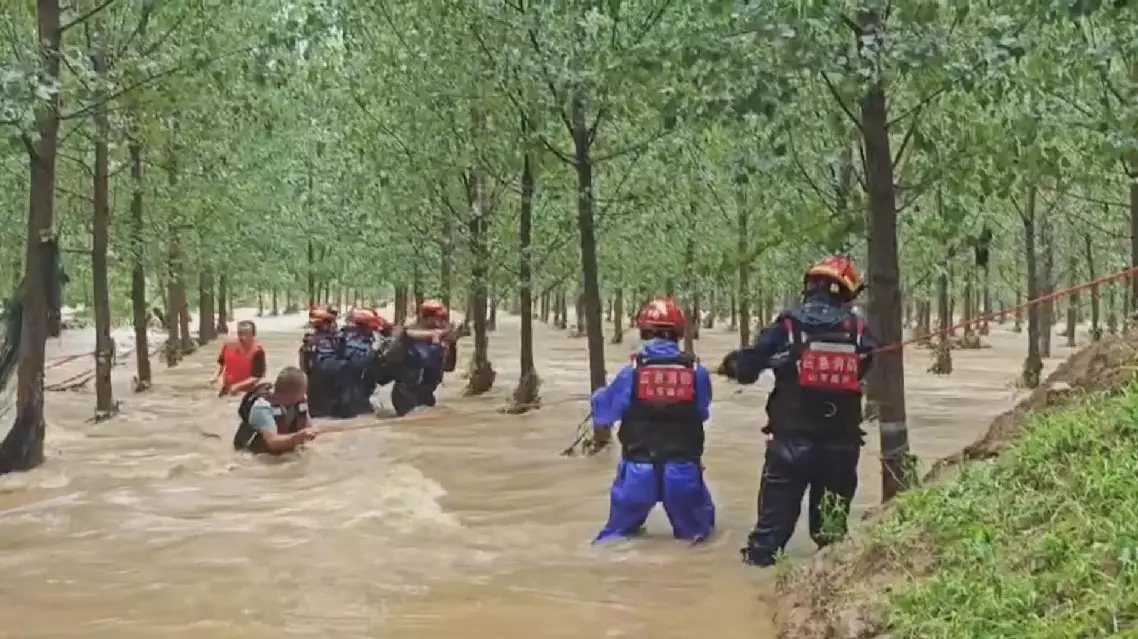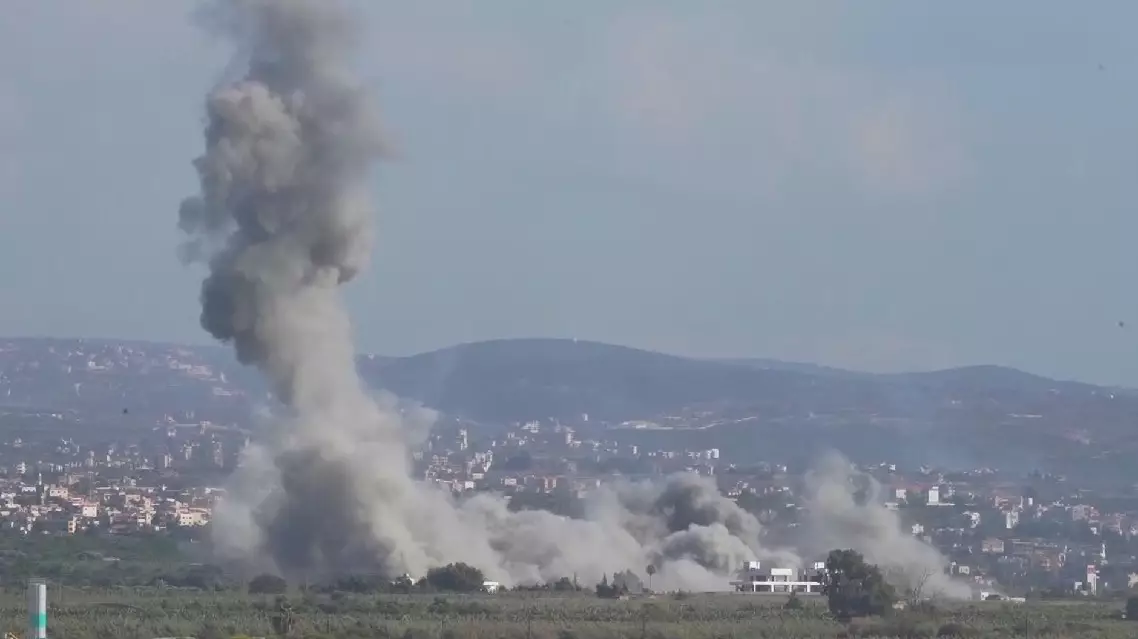Rescue operations are underway as severe storms and heavy rains caused widespread flooding across several provinces in China.
The State Flood Control and Drought Relief Headquarters on Sunday activated a Level IV emergency response to flooding in Shandong because of persistent heavy rains in the eastern province.
On Sunday morning, the local meteorological bureau in Shandong's Linyi City issued the highest-level rainstorm warning. Local firefighters evacuated an 84-year-old man who was trapped by floodwaters in his home as raging waters rushed by.
Jining, another city in Shandong experienced daily precipitation of 200 millimeters on Sunday, marking a historical extreme that posed a severe test for rescue and relief efforts.
Heavy rain caused a 40-meter breach in a dam in Sishui County, Jining, with a large amount of river water flowing out and a small section of the bank collapsed. A total of more than 400 rescuers reinforced the dam and relocated about 2,400 villagers from the affected Guxian Village.
Zhengzhou, the provincial capital of central China's Henan Province also experienced severe flooding on Sunday and Monday. The local meteorological bureau issued a yellow alert for rainstorms as water accumulated on major roads, with one section of Songshan Road reaching thigh-deep levels. Local authorities deployed pumping equipment and sent personnel to both ends of the road, advising passing vehicles and personnel to take detours.
Over 11,000 workers and 2,400 vehicles have been mobilized in the city, which remains under Level IV emergency response.
In southwest China's Sichuan Province, continuous heavy rain caused the closure of multiple national, provincial, and rural roads around the city of Langzhong due to floodwaters and fallen trees. Low-lying regions in downtown area also experienced severe inundation, with some underground tunnels impassable.
The Langzhong government activated a Level IV emergency flood response on Sunday afternoon. Traffic police are all on duty to guide vehicles. Transportation, housing and construction departments acted promptly to clear hidden dangers and conduct inspections of drainage systems and flood control facilities. Bridges, culverts, tunnels and other areas prone to waterlogging are monitored and checked in emergency response. Currently, rain is still ongoing in the area.
China has a four-tier, color-coded weather warning system, with red representing the most severe warning, followed by orange, yellow, and blue; There is also a four-tier emergency response system for flood control in the country, with Level I being the most severe response scenario.

Severe storms batter multiple Chinese provinces, prompting rescue efforts
The recent escalation of Israeli military operation against Lebanon may drag the whole Middle East region into a wide-ranging regional war, said Lebanese Agriculture Minister Abbas Hajj Hassan in an interview with China Global Television Network.
Since Sept. 23, the Israeli army has intensified its airstrikes against Hezbollah targets across Lebanon, causing great civilian casualties and forcing residents in many areas to leave their homes.
"We and the entire region are concerned about Israel's attacks. Therefore, when we call for a ceasefire today, we are echoing the calls from many countries. Israel must take responsibility for the current situation. Do you think the Israeli government will heed this appeal? Based on past experiences, I believe the answer is likely to be negative, as dozens, if not hundreds, of international resolutions --especially the latest U.N. Security Council Resolution 2735 -- have not captured the attention of the Israeli government. We must describe what is happening now as a barbaric crime in history, unprecedented in both Lebanese and human history. Over the past year, we have suffered greatly, but in the last few hours and days, Israel's behavior has become increasingly blatant, completely disregarding any law, international norms, humanitarian, or moral constraints," said the minister.
After 247 days of the latest round of Palestinian-Israeli conflict in Gaza, the Security Council adopted Resolution 2735 on June 10 proposing a comprehensive three-phase ceasefire deal to end the conflict in Gaza, urging both Israel and Hamas to implement it fully and without delay and condition.
In the interview, Hajj Hassan said that Israel's airstrikes on Lebanon have caused huge economic losses because they target infrastructure and farmland.
"Therefore, I want to emphasize that if the humanitarian and economic losses have reached such a significant scale, you can imagine the extent of the losses in the agricultural sector. We are discussing not only the agricultural sector but also the labor force and import and export activities. What I want to convey is that we have been unable to secure key crops. Moreover, the Beqaa Valley is a vital component of Lebanon's economy and agriculture, as well as an important base for Lebanon's military reserves and supply. Currently, we are unable to cope with the destruction caused by the war. Israel's indiscriminate bombing has now spread to 83 villages and cities, including Baalbek (a city located east of the Litani River in the Beqaa Valley) and areas such as the Kola District of Beirut, and the situation in the south remains bleak. Additionally, the white phosphorus released by the Israeli army is igniting hundreds, if not thousands, of dunams (hundreds of hectares) of land each day, effectively turning these areas into scorched earth and forcing residents to flee," he said.
The Beqaa Valley is a fertile valley in eastern Lebanon and is Lebanon's most important farming region.
The conflict also has had a negative impact on all economic fields in his country, he said.
"There is no doubt that the war will lead to rising prices, which may result in a shortage of some products. However, our ministry is addressing this situation in great detail, despite the threats and bombings and some staff members are unable to access the bombed areas. Currently, the bombing has spread to the southern, western, and eastern regions of Lebanon, and the coastal areas have also been affected, extending even to the western Beqaa Valley and the farthest border between Lebanon and Syria," the minister said.
In the interview, Hajj Hassan extended his gratitude towards China's support for his country, particularly its financial assistance to refugees.
"As far as China's position is concerned, both the government and the people of China have consistently supported us and provided assistance following the crisis in 2019. We are deeply grateful for this. We see this as support that transcends politics, grounded in humanitarian and practical aid. This support is extremely important, and the relationship between our two countries is developing rapidly. We uphold a philosophy of prioritizing our own interests while also considering China's interests. Therefore, within this framework, we will strengthen cooperation with China to protect and support our people, enhance the development of the agricultural sector, and ensure food security," Hassan said.
Lebanon has been mired in an unprecedented financial crisis since late 2019. The collapse of the local currency and devaluation of wages, paralleled by heavy restrictions by banks on cash withdrawals, plunged the majority of the population into poverty.

Escalation of Israeli military operations pulls Middle East toward full-scale conflict: minister










